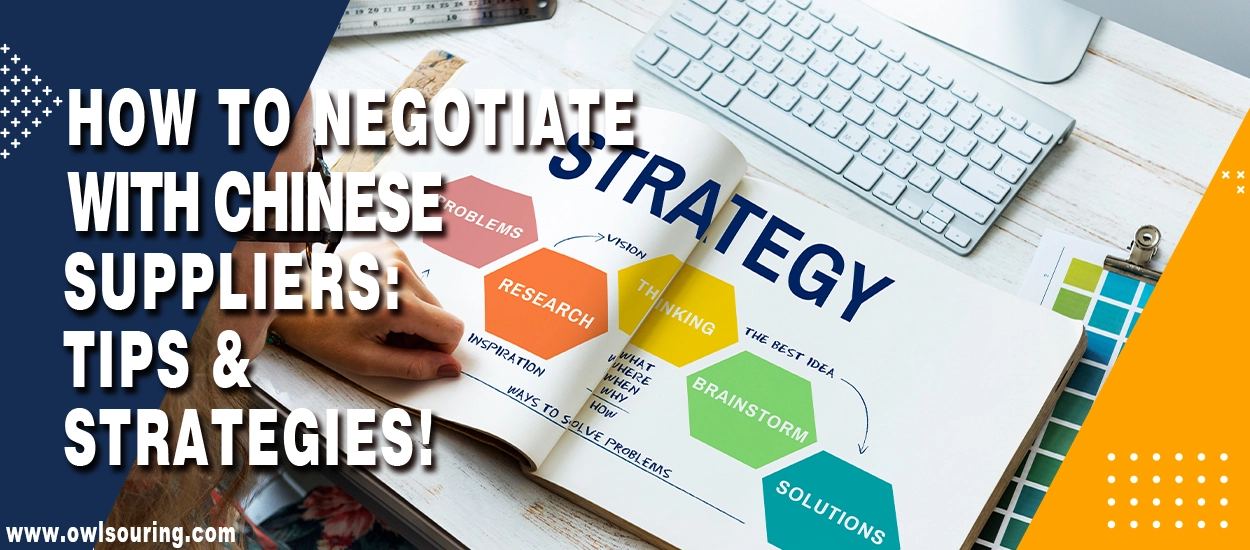Are you looking to negotiate with Chinese suppliers? It can be tricky. International trade is complicated. Different cultures add to the challenge.
I must say negotiating with Chinese suppliers is somewhat challenging. You have no idea about their unique culture or language. How can things move if you don’t know both these aspects?
So, I will create a post to help you negotiate and build strong relationships with them. Trading with Chinese suppliers involves a lot of money. Knowing how to deal with manufacturers is key to getting products effectively.
Key Takeaways
- Know cultural differences for better negotiations with Chinese suppliers.
- Be patient and persistent in negotiations when importing products from China.
- Build relationships for better deals and lasting partnerships.
- In the West, people are often direct. Being assertive is common. In contrast, Chinese negotiations focus more on building relationships.
The Importance of Confucian Values

Confucianism significantly shapes Chinese business. Key values such as respect, hierarchy, and harmony are integral to society. Knowing these values enhances negotiation.
For many years, they have shaped China’s culture in areas such as family and business. The key principles include:
| Principle | Meaning |
| Respect and Filial Piety | Honouring parents, elders, and authority figures. |
| Hierarchy | Understanding and respecting the social order, with everyone knowing their role. |
| Harmony | Promoting peace, cooperation, and avoiding conflict. |
| Ritual and Etiquette | Proper behaviour and following customs are highly important. |
| Face (Dignity) | Preserving dignity and reputation in social interactions. |
In business, it’s important to value respect and harmony. Don’t embarrass or undermine others. When talking to your supplier, be careful not to pressure them. Show respect and tact in your conversations.
Also, in Chinese businesses, hierarchy matters a lot. Usually, top executives make decisions. Remember to respect this when negotiating. Always use titles when talking to your contact. Showing respect for their position helps build a good relationship.
Note: Ensure you know all these values before you contact Chinese manufacturers.
Build Relationships – 关系 (Guanxi) With Your Chinese Supplier

When negotiating with Chinese suppliers, the concept of Guanxi (关系) is crucial. Guanxi means the personal connections and relationships you build in business. Strong Guanxi can get you better deals, special treatment, and lasting partnerships.
Suppliers often favour customers they know over those offering the highest price.
I have three tips for you to establish and maintain strong relationships.
1) It doesn’t matter whether you find suppliers on Chinese wholesale websites or use a sourcing agent service. Take your time building relationships. Please get to know your suppliers well and take a genuine interest in their work and culture.
2) Socialising outside of work helps, too. If you’re in China, for example, inviting your supplier to dinner can strengthen your bond.
3) Being honest and reliable is key when you buy from China. Trust is crucial, so always keep your word. Suppliers prefer working with people they trust.
Preparation is Essential When Negotiating with Chinese Suppliers

Before negotiating, prepare. First, research your supplier and the market. Look into your supplier’s history and what they can do. It’s important to know their strong and weak points.
This knowledge can help you negotiate better. Use the internet, go to trade fairs in China, and talk to people you know to learn more.
Understand the usual prices in your industry. It helps you see if the prices from Chinese suppliers are fair.
Effective Communication Techniques During Negotiations with Chinese Suppliers

Good communication is key to successful deals. Why? Because culture and language can make things tricky.
It doesn’t matter whether you buy wholesale from the Yiwu market or prefer to buy from Alibaba. Communication will get you there!
Being clear and direct is important, but respect is vital too. Chinese suppliers might not understand certain terms. So, avoid complex jargon, idioms, or slang. It ensures everyone understands each other.
Be clear but also kind and reasonable. Balance clarity and respect to keep a good relationship with your supplier.
FOB vs. EXW China supplier negotiations
- EXW (Ex Works). You pick up goods at the factory and manage the inland transport, export clearance, freight, etc. This is going to be cheaper upfront, but you will deal with more headaches.
- FOB (Free on Board). The supplier manages local transport to the port and the export clearance. You take over the shipping at the port of departure.
- The best practice is to negotiate a FOB pricing, which reduces hidden risks (like inland fees in China), as well you have the supplier responsible for export customs.
Tip: Always ask for both EXW & FOB quotes, then look at the real total landed costs with your freight forwarder.
How to get the best pricing from Alibaba suppliers?
- Contact more than one supplier: You never want to go with your first supplier – always compare at least 5 – 10.
- Get their “best FOB price”: This shows you know Incoterms and avoids inflated pricing.
- Negotiate around MOQ & payment terms and not just unit price – sometimes trying to lower MOQ a little is better than trying to save cents off the unit price.
How to negotiate price with the supplier on Alibaba?
- Be professional & respectful: Don’t use words like “too expensive”, instead say, “Could you recommend a better price if we increase our order quantity?”
- Understand level “price brackets”: Suppliers have standard cost structures, like 500 units, 1,000 units, and 5,000 units. Negotiating involves moving you into the next tier, not demanding 5,000 unit pricing from a 500 unit purchase.
- Ask for add-ons instead of discounts: Free packing, better payment terms or small extras can save you money.
Mastering Negotiation with Alibaba Suppliers
Successful procurement negotiation skills will help you negotiate wholesale prices, negotiate with Chinese suppliers, and achieve the best bargains while maintaining long-term business prosperity.
Our team will help you get the best deals from them through expert negotiation and streamlined sourcing strategies.
Beyond just cost savings, you’ll also build valuable supplier relationships, fostering long-term success and a more sustainable supply chain.
Let OwlSourcing handle the complexities so you can focus on growing your business with confidence. Contact Us now!
4 Ways to Overcome Language Barriers
Not all suppliers speak English well. It often causes misunderstandings. Here are some solutions:
1) Get a Translator

For complex deals, it’s best to hire a professional translator. They know both languages well and understand the cultural background. This person can clear up confusion and ensure no details are lost in translation.
For example, suppose you want to ask – How to buy wholesale from China? A translator will speak it in a local language, something like this –如何从中国批发购买?- Rúhé cóng zhōngguó pīfā gòumǎi?
I know you couldn’t read the translated phrase either. Don’t worry! A good translator will handle the task.
2) Use Translation Software
If you can’t hire a translator, try using translation software. But remember, it’s not flawless. Sometimes, it can get words or phrases wrong, especially with complex topics.
Always double-check the translations. It helps everyone understand the important points.
3) Use Simple Language

Always make your language simple. Avoid long, complex sentences. Use short, clear sentences. Choose words that are easy to translate. Avoid cultural references or humour. They might not translate well.
You don’t have to type in the full sentence. For example, I was hoping you wouldn’t say I want to find a reliable manufacturer in China who can make umbrellas. Instead, you can just type find umbrella manufacturers in China. The same thing goes for finding toy manufacturers in China.
4) Know the Supplier
Make sure you understand the supplier. I am not asking you to verify the Chinese vendor in this step. It is a different thing!
Don’t think silence is a yes. Ask questions to clear things up. Let your supplier ask questions, too. Doing this early can save you from big mistakes later.
Key Strategies for Successful Price Negotiation
Negotiating prices with suppliers from China is a skill. It’s not about arguing over numbers.
1) Contact Suppliers

Your approach can shape the negotiation. If you want to buy from a Chinese factory directly, you must keep it professional.
Begin with a polite email or call to show interest in their products. Be brief and professional. Include specific details about your needs to help the supplier understand.
2) Start By Making an Anchored Offer
Start by making an anchored offer. It means setting the initial price to shape the negotiation. Make your first offer good for you, but reasonable. It sets a benchmark and frames the discussion. For example, in a bulk purchase, offer less than what you aim for.
3) Research Market Prices
Before you start negotiating, know the market prices. Check what similar products cost. This knowledge helps you make stronger arguments.
If a supplier’s price is too high, use your research to make a better offer. It shows you understand the market, reducing the chance of being overcharged.
4) Be Ready for Counteroffers
Counteroffers are common in negotiations. Don’t see them as rejections. Think of them as a chance to learn more about your supplier’s needs. Stay calm and thoughtful when you get a counteroffer.
Ask why they suggest a certain price. It could lead to more talks and a better deal. You might find out that changing your order size or delivery terms could lower the price.
5) Choose Bulk Orders

Buy in bulk from Chinese suppliers to save money. There are many top wholesale websites for bulk purchasing. They prefer selling more because it’s more profitable. If you can, offer to buy more in exchange for a lower price. This trick can also help you get better deals in the future.
Even with a small first order, it hints at future bigger ones. Suppliers negotiate if they see you as a recurring customer.
6) Consider Non-Price Factors
Don’t just focus on price when negotiating. Your supplier might not lower the price, but there are other benefits to consider. Think about negotiating for better payment terms. You could also ask for lower shipping costs. Or, try to get faster delivery times.
7) Know When to Walk Away
Walking away is a key strategy in negotiations. If a supplier doesn’t meet your terms or the price feels too high, be ready to step back.
This move can give you more leverage, as suppliers might offer better terms to avoid losing the deal. When pausing talks, be diplomatic. Tell the supplier you’re considering other options. But you’re open to resuming talks if they reconsider their offer.
8) Stay Professional and Build Relationships
Negotiation can seem tough, but always be professional and respectful. In China, long-term relationships matter.
View negotiations as the start of a partnership. Stay polite, even in disagreement. A good supplier relationship can improve future terms and business. After doing everything, ensure you create a valid manufacturing contract in China.
Negotiating prices with Chinese suppliers
- First, it is important to research average market prices on 1688 (a Chinese domestic site which is cheaper than Alibaba) to understand the correct factory cost range.
- Bundle your orders: Discuss total volumes for the entire year, and suppliers will respond to quantity and long-term commitment much better than to one shipment.
- Don’t push too low: Unreasonably low offers will make a supplier cut corners on quality or simply ghost you. You want a fair price + reliability, not “cheapest”.
- Use competition. Politely mention that you are getting quotes from other suppliers, which delivers healthy pressure.
How to Negotiate MOQs with Chinese Suppliers?

Suppliers set MOQs to keep production efficient and profitable. However, you might not always need large amounts.
Lowering the MOQ is important for reducing risks and saving on inventory costs. See some tips on how to negotiate MOQs effectively:
1) Understand the Supplier’s MOQ Rationale
Before you start negotiating, it’s key to understand why the supplier chose their MOQ. Suppliers often pick MOQs based on their costs to produce and buy items and to run their factories.
Also, ask the supplier to explain their MOQ reasoning. By understanding their side, you can spot where there’s room to negotiate. If the MOQ is high because of material costs, for instance, you could offer to help cover those costs.
Check the low MOQ Alibaba supplier guide for more insights.
2) Build a Strong Case for Lowering MOQs
When you talk to suppliers about MOQs, be clear and convincing. Tell them why it’s good for them to lower their minimums. Show them you’re a promising long-term partner, even if your first order isn’t huge.
Suppliers are more open to negotiation for a chance at bigger orders.
Mention your brand’s potential and how it’s likely to grow. You must aim to make them see the promise of more business later.
3) Offer to Pay a Higher Price for a Smaller Order

If a supplier doesn’t lower their MOQ due to costs, try a different tactic. Offer to pay a bit more for each unit but ask for fewer units in return. It helps the supplier cover their costs while you get to order less.
4) Negotiate a Trial Order
If a supplier has a strict Minimum Order Quantity (MOQ), suggest a trial order. It’s useful, especially with new suppliers, to check their product quality and service.
Suppliers might lower their MOQ for a trial if they see the potential for bigger future orders. Make it clear that this is a test. If things go well, you’ll make larger orders later.
5) Combine Orders with Other Products
If your supplier has many products, you can order different items to meet the MOQ. Can’t meet the MOQ for a single product? Try mixing different items to reach the minimum.
It helps the supplier run their production smoothly. It gives you a variety of products without ordering too much of one thing.
How to negotiate MOQ with Chinese suppliers?
- Explain your business plans: Supplier flexibility is possible if they see you have a longer-term potential.
- Offer to pay a little bit more per unit if they will do a smaller “non-MOQ” batch; this way, they can cover their setup costs.
- Combine SKUs… Rather than going back and forth, lowering the MOQ per product, ask the supplier if you can mix different models/ and or colours into one big MOQ.
- Start small, Scale later… If and when trust is built, suppliers will typically reduce the MOQ without you even needing to ask.
Rules to Negotiate Payment Terms and Production Times
You will see standard payment terms like 30/70 or 50/50. Alternatively, you can use letters of credit. These terms require a deposit. Then, pay when production is done.
Understanding these terms is crucial. It helps you plan your cash flow better and guides you in negotiations.
Begin negotiations by seeking smaller upfront deposits. Additionally, ask for more time to make payments. You can entice suppliers by placing larger orders or committing to long-term relationships. This approach may lead them to consider more flexible payment terms.
You can implement a payment structure that progresses with production milestones. This strategy safeguards your investment.
Communicate your schedule clearly, keeping the supplier’s lead times in mind. By establishing clear deadline expectations, you can ensure your orders arrive when needed.
First, you should decide the best way to pay Chinese suppliers. After that, you can proceed to negotiate all the above factors.
Read More:
- How to Import Building Materials From China?
- Benefits of Working with China Sourcing Agents
- Sourcing Machinery from China
- Best-Selling Amazon Products You Can Import From China
Final Thoughts!
Negotiating with Chinese suppliers can be tricky but rewarding. First, you must understand their culture, then build strong relationships and prepare well. It ensures successful talks that help your business.
It’s not just about the lowest price. It’s about creating partnerships for shared success.
When negotiating with Chinese manufacturers, remember these tips. They will help you in international trade.
You can choose OwlSourcing to find a manufacturer in China on your behalf. Our team will help you get the best deals from them. You’ll also build valuable supplier relationships.


